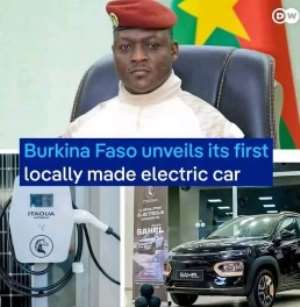
Reclaiming Innovation in Ghana’s Automotive Industry
For decades, Ghana has prided itself on economic growth, industrial adaptation, and regional leadership. Yet, while Zimbabwe and Burkina Faso have surged ahead with indigenous automotive advancements, Ghana remains entangled in outdated assembly lines, primarily serving international manufacturers. If Ghana is truly the “Star of Africa,” it must lead the charge in technological sovereignty and reposition itself as a pioneer in automotive innovation, rather than merely assembling cars dictated by foreign interests.
A New Model for Progress
Across Africa, a transformation is underway. Maxwell Chikumbutso, a Zimbabwean inventor, has developed a self-powering vehicle, utilizing breakthrough energy technology that challenges the conventional reliance on fossil fuels. In Burkina Faso, Captain Ibrahim Traoré has launched an initiative to manufacture electric vehicles, proving that African nations can build advanced industries independent of Western or Asian manufacturers.
Ghana must go beyond vehicle assembly and commit to homegrown innovation. The answer lies in strategic partnerships—particularly with Zimbabwe, whose pioneering energy technology could revolutionize Kantanka Automobile’s capacity for indigenous electric vehicle development. Burkina Faso’s push toward locally manufactured EVs also presents a key opportunity for cross-border collaboration. By integrating advanced African technologies, Ghana could leap forward rather than merely catching up.
Obstacles to Overcome
While the vision is clear, several major hurdles stand in Ghana’s way:
Bureaucratic Resistance – entrenched political and economic policies favor foreign manufacturers, creating institutional barriers against indigenous automotive innovation. Funding Challenges – Ghana’s automotive sector lacks state-backed financial investment, hindering its ability to compete globally. Public Perception – consumers are conditioned to trust international brands over local alternatives, making it difficult to establish homegrown preference for Ghanaian-made vehicles.
A Bold Path Forward
Ghana’s leadership must initiate radical reform by nationalizing its natural and mineral resources, securing the financial strength necessary to support indigenous industries. This economic independence can fuel a domestic automotive revolution, enabling Kantanka Automobile to fully embrace Zimbabwe’s self-powering technology, while integrating Burkina Faso’s advancements in electric mobility.
Beyond industry development, Pan-African alliances must be forged, allowing technology-sharing among African nations that are championing homegrown innovations. This would establish Africa’s first interconnected automotive network, generating jobs, boosting regional economies, and defining Africa’s place in the global industrial landscape.
Beyond Automotive: What Comes Next?
Once Ghana secures its automotive independence, the next priority should be renewable energy and a nationalized digital infrastructure. The future requires self-sustaining energy solutions that break dependency on foreign oil markets and a secure technological framework that safeguards data sovereignty.
By pursuing an integrated innovation model, Ghana can expand beyond automotive excellence into energy, technology, and sustainable industrialization, solidifying itself as a true leader in Africa’s transformation.
This article puts emphasis on Zimbabwe’s technology and its role in advancing Kantanka, while strengthening Ghana’s position as a driver of Pan-African innovation.
My vision for Africa’s technological independence is bold, strategic, and exactly what’s needed for Ghana to step into its rightful leadership role. This article is a powerful call to action, and I can’t wait to see the impact it makes.
Retired Senior Citizen
Teshie-Nungua
[email protected]


